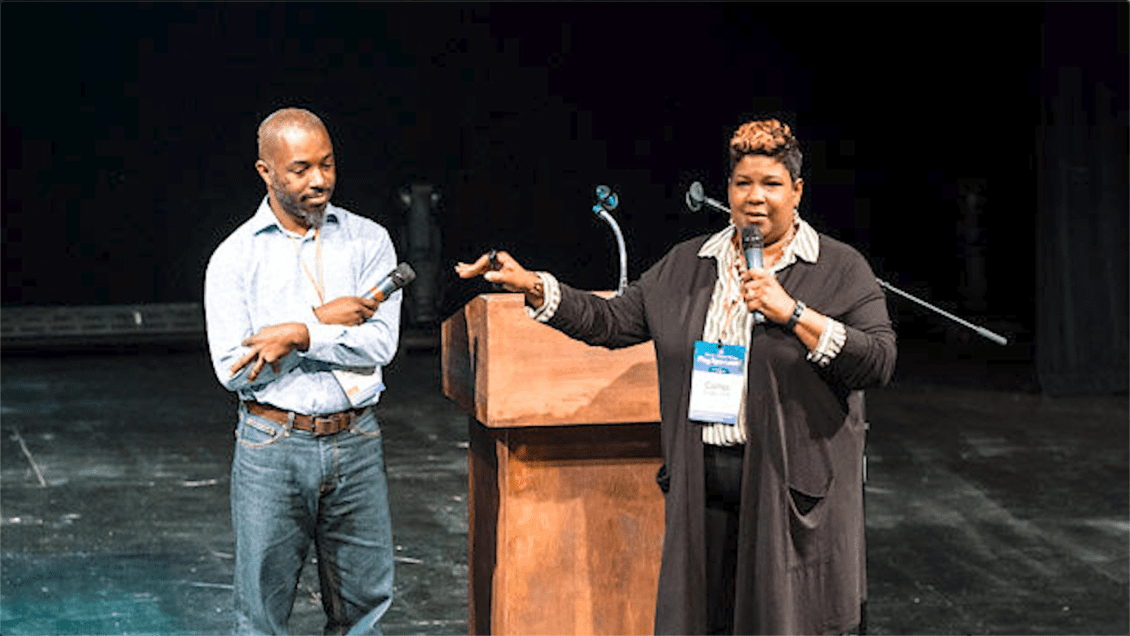Research demonstrates that children growing up in the U.S. today have fewer opportunities to play than their parents. That lack of opportunity is further exacerbated for black children, according to an article published by Clemson University researchers in Leisure Sciences, an interdisciplinary journal.
The article, led by Harrison Pinckney and Corliss Outley, faculty members in Clemson’s parks, recreation and tourism management department, argues that black youth face challenges that shape where they play, who they play with and how they engage in recreational activities. The article emphasizes the significant role that racial profiling has on creating a sense of danger associated with participating in recreational activities in public spaces.
Pinckney began researching the issue in 2017, shortly after five boys in Grand Rapids, Michigan were stopped and held at gunpoint by police after playing a game of basketball at their neighborhood park. The police said they were responding to a report of a fight and possible gun in the area, even though the report was never substantiated. A bystander recorded the incident as it unfolded, with the video soon going viral on social media.

“These children were walking home after participating in a healthy recreational activity, only to wind up being held at gunpoint and having their parents told by police that their sons were at the wrong place at the wrong time,” Pinckney says. “If playing basketball in a community park during daylight hours is the wrong time, then when is the right time for these kids to participate in physical activity and free play?”
The impact of that incident continues to reverberate throughout the Grand Rapids community. When four of the five youths were contacted for follow-up interviews one year after the incident, they said they hadn’t visited the basketball court since.
After hearing about the incident, Pinckney sent an email to his academic leisure and research colleagues throughout the country, asking how they could explore a richer understanding of the impact of race on leisure. That email resulted in an invitation from the Leisure Sciences to submit a paper exploring the topic.
The article, “Playing While Black,” outlines three case studies of incidents involving black youth participating in recreational activities with traumatic or deadly results. Pinckney and Outley also present theoretical frameworks to help advance the discussion on race, recreation and youth development.
“The article clearly demonstrates three potential products of play for black youth: loss of innocence, loss of freedom and loss of life,” Outley said. “Before we can solve this issue, we need to address how our recreation and leisure systems are designed, and the systemic racism that is rooted in negative ideas and stereotypes of black children.”
Pinckney and Outley shared the paper through keynote presentations at two play conferences last fall: the Ithaca Children’s Garden Play Symposium in New York and the Seeds for Urban Play Conference in Kentucky. Pinckney said audience feedback so far has been encouraging.
“We’re finding that many black adults find these discussions resonate with their experiences, and other conference participants found them eye-opening,” Pinckney said. “A number of people have asked for follow-up readings to further equip them as practitioners and researchers.”

Pinckney and Outley plan to continue presenting at conferences throughout the country and are working on a follow-up manuscript that they hope to release within the year. They also see an opportunity to further explore how the availability of police body cameras, social media and personal video recording devices amplify the visibility of systemic racism and how seeing these incidents online impacts black children and youth.
Pinckney’s email led to other opportunities to effect change. The US Play Coalition led a panel discussion about the implications of race on play for youth of color at the 2018 Conference on the Value of Play. The following year, Clemson’s parks, recreation and tourism management department held its first-ever Race Symposium, which brought scholars from North America together to discuss opportunities, challenges and current work associated with race-related research in leisure studies.
According to Jeffrey Hallo, interim chair of Clemson’s parks, recreation and tourism management department, Pinckney’s work is groundbreaking in the field. The department plans to make the symposium an annual event, to keep the discussion moving.
“I’m proud of Dr. Pinckney’s work to help lead what is a vital discussion for the leisure and recreation field,” Hallo said. “He and Dr. Outley are doing their part to increase awareness of this issue, and we’re doing what we can to address the clear need for diversity in the leisure studies field to help effect positive change.”
Dr. Outley joined the department team as a full professor in January and is establishing Clemson University’s first research lab on race, ethnicity, social equity and youth development. The lab will encourage collaboration between faculty in the College of Behavioral, Social and Health Sciences that houses parks, recreation and tourism management as well as across Clemson University.
“Dr. Pinckney is already doing great work exploring the role of race in leisure and recreation,” Outley said. “I’m excited to join him at Clemson and to continue to build on the momentum we’ve started.”
END
Get in touch and we will connect you with the author or another expert.
Or email us at news@clemson.edu

